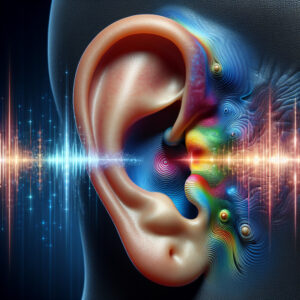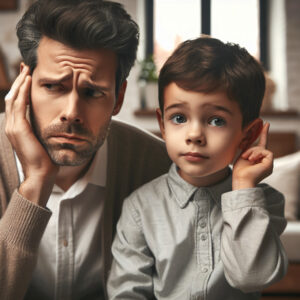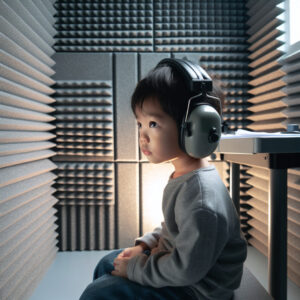Preventing Bilateral Sensory Hearing Loss: What You Need to Know
Understanding Bilateral Sensory Hearing Loss Definition and Overview Bilateral sensory hearing loss, also known as sensorineural hearing loss, affects both ears and occurs due to damage in the inner ear or the auditory nerve. This type of hearing loss is permanent and generally progressive, meaning it can worsen over time. It can have a significant… Read More
The Science Behind the Normal dB of Hearing: An In-Depth Look
Introduction to Hearing and Decibels Hearing is one of our most vital senses, allowing us to communicate, enjoy music, and stay aware of our surroundings. The intensity of sound is measured in decibels (dB), a logarithmic unit that quantifies sound pressure levels. Understanding the normal dB of hearing is essential for evaluating hearing health and… Read More
The Impact of Moderately Severe Mixed Hearing Loss on Daily Life
Introduction to Moderately Severe Mixed Hearing Loss Definition of Moderately Severe Mixed Hearing Loss Moderately severe mixed hearing loss is a type of hearing impairment that combines both conductive and sensorineural hearing loss, affecting individuals’ ability to hear sounds in the 56-70 decibel range. Conductive hearing loss occurs when sound cannot efficiently travel through the… Read More
Early Signs of Sensorineural Hearing Loss and Tinnitus: When to Seek Help
Introduction to Sensorineural Hearing Loss and Tinnitus Sensorineural hearing loss and tinnitus are two common auditory issues that can significantly impact one’s quality of life. Understanding these conditions and recognizing their early signs is crucial for timely intervention and treatment. Sensorineural hearing loss involves damage to the inner ear or the nerve pathways from the… Read More
How to Recognize the Signs of Sloping Sensorineural Hearing Loss
Introduction to Sloping Sensorineural Hearing Loss Sloping sensorineural hearing loss (SSNHL) is a common yet often misunderstood condition affecting a significant portion of the population. This type of hearing loss is characterized by a gradual decrease in hearing ability, particularly at higher frequencies. Recognizing the signs of SSNHL is crucial for early intervention and effective… Read More
Mastoiditis Hearing Loss: Early Symptoms You Shouldn’t Ignore
Understanding Mastoiditis and Its Impact on Hearing What is Mastoiditis? Mastoiditis is an infection that affects the mastoid bone, a part of your skull located behind your ear. This bone has a honeycomb-like structure filled with air, which can become infected if an ear infection spreads. Mastoiditis is more common in children but can occur… Read More
How Usher Syndrome Hearing Loss Affects Daily Life
Understanding Usher Syndrome Hearing Loss Definition and Overview Usher syndrome is a genetic condition characterized by a combination of hearing loss and vision impairment. The hearing loss aspect of Usher syndrome can vary in severity, affecting an individual’s ability to communicate and interact with their environment. Typically diagnosed in childhood, Usher syndrome hearing loss is… Read More
The Impact of Shari Eberts’ Work on the Hearing Loss Community
Introduction to Shari Eberts Shari Eberts is a prominent advocate for the hearing loss community, known for her relentless dedication to raising awareness and providing support to those affected by hearing impairments. Born into a family with a history of hearing loss, Eberts has firsthand experience of the challenges faced by individuals with hearing difficulties…. Read More
Normal Hearing Loss with Age: What You Need to Know
Introduction to Normal Hearing Loss with Age What is Age-Related Hearing Loss? Age-related hearing loss, also known as presbycusis, is a gradual decline in hearing ability that occurs naturally as we get older. It is one of the most common conditions affecting older and elderly adults. The loss typically affects both ears and progresses slowly… Read More
Turner Syndrome and Hearing Loss: Symptoms, Causes, and Treatments
Introduction to Turner Syndrome and Hearing Loss Overview of Turner Syndrome Turner Syndrome is a chromosomal disorder that affects approximately 1 in 2,500 live female births worldwide. It occurs when one of the X chromosomes is missing or partially missing, leading to a variety of medical and developmental issues. These can include short stature, delayed… Read More
Ear Damage Treatment Success Stories: Real-Life Experiences and Outcomes
Introduction to Ear Damage Treatment Success Stories When it comes to ear damage treatment, real-life success stories offer invaluable insights and hope. These narratives not only highlight the effectiveness of various treatments but also provide a sense of community and understanding for those facing similar challenges. Ear damage can manifest in various forms, from hearing… Read More
Natural Remedies for Autoimmune Inner Ear Disease Treatment
Introduction to Autoimmune Inner Ear Disease (AIED) Autoimmune Inner Ear Disease (AIED) is a rare but serious condition characterized by progressive hearing loss and dizziness. It occurs when the immune system mistakenly attacks the inner ear, leading to inflammation and damage. Understanding AIED is crucial for early diagnosis and effective management. Patients often experience a… Read More
From Sore Throat to Hearing Loss: A Comprehensive Guide
Understanding the Connection Between Sore Throat and Hearing Loss A sore throat and hearing loss might seem unrelated, but they can be closely connected. Both conditions share common roots in the anatomy and physiology of the ear, nose, and throat (ENT) system. Understanding the underlying causes of a sore throat and its potential impact on… Read More
Hearing Aids for Older Adults: Enhancing Quality of Life
Introduction to Hearing Aids for Older Adults As we age, various aspects of our health require more attention, and hearing is no exception. In fact, hearing health is crucial for maintaining a high quality of life in older adults. Hearing aids for older adults have become increasingly important in combating the challenges of hearing loss…. Read More
Living with Profound Hearing Loss: Tips and Strategies
Understanding Profound Hearing Loss Definition and Causes of Profound Hearing Loss Profound hearing loss refers to a severe degree of hearing impairment where an individual struggles to hear sounds below 90 decibels. Causes vary and include genetic factors, complications at birth, chronic ear infections, exposure to loud noise, and certain illnesses like meningitis. While some… Read More
















